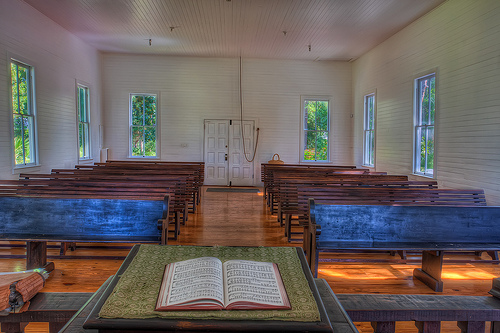I’m reading a novel by a best-selling author that reminds me of one of the cardinal rules of writing:
Write what you know.
The author describes a coalition of five churches in a small town in Michigan who gather to deal with an emerging crisis. The churches are listed as Catholic, Methodist, Baptist, Protestant, and nondenominational. Upon reading that, you who visit this Working Preacher website instantly did a double-take. How did a “Protestant” congregation end up in that list as a denomination separate from the other three Protestant denominations?
Given the jumble of Christian sects in the world, such confusion is understandable, particularly if, as in the case of this author, you have little familiarity with the Christian church.
But when you present yourself as someone worth listening to, as all authors and preachers must, the last thing you want to do is to give your listener a cringe-worthy reason to doubt that you know what you’re talking about. In my case, I got side-tracked from an otherwise intriguing story wondering how such a glaring mistake escaped the editor’s notice.
Such things happen when a preacher wanders too far from familiar territory. There’s nothing wrong with exploring unfamiliar subjects. I admit I’m often more fascinated by what I don’t know than by what I know. The problem comes when we take advantage of our semi-captive audience to project authority we do not have.
Just because I am given the authority to preach doesn’t mean I am exceptionally knowledgeable in whatever I choose to talk about. Nor am I called to be. In fact, listeners will be far more receptive to what I have to say if I recognize and acknowledge where our experiences converge, or where their areas of expertise and insight exceed mine.
As a pastor, there are a number of areas where my knowledge likely exceeds that of my congregation; if there weren’t, I wouldn’t be qualified to be a pastor. In addition, my experiences are my own, and I am the world’s expert on what has happened to me. On that subject, I know what I’m talking about.
For the proclaimer of God’s word, that should be ample authority. I don’t need to be an expert on anything else. I don’t need to have all the answers, solve the complex problems of our society, or know more than anyone else on the issues. I don’t need to claim that my experience supersedes anyone else’s experience.
We are called in the book of Acts to be witnesses. When I speak from my experience, that is what I am doing — witnessing.
The pulpit is a witness box. In my courtroom experiences, I don’t recall anyone claiming the authority of the witness stand. It’s simply a place where people are expected to speak the truth, as they know it. If they have a bit of expertise to share, they are expected to do so. When they wander out of their area of experience or expertise, the attorneys are quick to call them on it.
Preaching is a form of witnessing. Telling the truth by sharing experiences of the grace and love and justice of God, in the person of Jesus Christ. Applying any training and insight we have received to the communication of that message.
Apart from that, when I’m in the pulpit, I really don’t know much. Nor do I need to.

